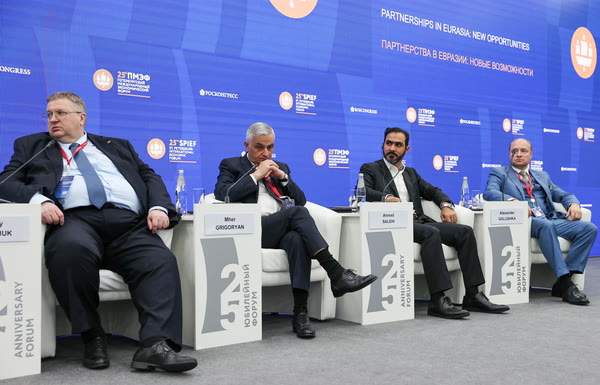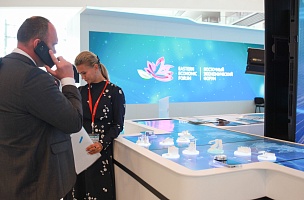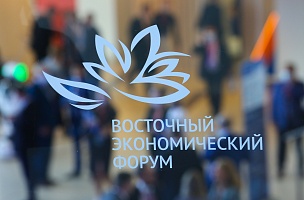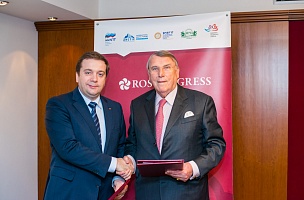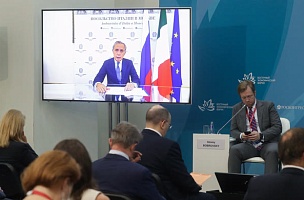The pandemic and sanctions have aggravated the global situation and
triggered a process of reconfiguration
"It is necessary
to understand that there is a very serious process of reassessment, of
rethinking the world order. That is why, indeed, these challenges are
constantly arising and certain things are constantly being called into
question," said Alexey Overchuk, Deputy Prime Minister of the Russian
Federation.
"What is happening today is, in
fact, a big stress test, which highlights some issues that we have touched
upon, but have not addressed at the proper pace, or haven't addressed at all,”
said Mher Grigoryan, Deputy Prime Minister of the Republic of Armenia.
The reorientation of traffic flows and their shift to the East
"Of course, we see that
transport and logistics flows are being reoriented. We see how Europe is
striving to trade with us. This means that we are actively looking for new
trading partners in other parts of the world, and, incidentally, we have found
them in Iran, India, Egypt, and China. And all of this leads to the fact that
we can already see from the statistics that there is a reorientation of
commodity and cargo flows from the West to the East, and this is a very serious
shift,” said Alexey Overchuk, Deputy Prime Minister of the Russian Federation.
"There are very
broad prospects for cooperation between Russia and the African continent. We
know that the Russian Federation is an important hub in Asia as a whole, and we
can say that we believe Egypt is a very important hub in Africa for Russia and
Egypt to move forward together in Africa," said Yahya Al-Wathiq Billah,
the First Deputy Minister of Trade and Industry of the Arab Republic of Egypt
and the Head of the Egyptian Commercial Service.
PROBLEMS
Changes in the global financial system
"We can see how the financial
system, which has worked for a long time and has satisfied everyone, is
beginning to fail. And we can also see that such an inviolable thing like the
system of property rights is starting to fail. We can see this in the example
of Russian citizens today. Judicial systems in the West are beginning to fail.
And all this leads to the fact that a certain revision of international
institutions is beginning," said Alexey Overchuk, Deputy Prime Minister of
the Russian Federation.
“We are constantly discussing the
issue of trade, the currency in which we trade, and the movement towards
increasing the share of trade conducted in national currencies within the EAEU.
We are almost constantly trying to solve this problem, and we have a situation
in which, in some ways, the share of trade in national currencies has
increased. However, this is not the result we are dreaming of, because it is
all still tied to other currencies. This is a serious burden,” said Mher
Grigoryan, Deputy Prime Minister of the Republic of Armenia.
"Of course, the
freezing of Russia's national reserves, the escalated militarization of the
world's reserve currency, and the fact that there is no guarantee that there
are no more risks for Russia, have all definitely made more acute the issue
that has been talked about for a very long time: the dollarisation of foreign
trade relations, including within the Eurasian Union,” said Alexander Galushka,
Vice President of the Civic Chamber of the Russian Federation.
Logistics and the food crisis
"In today's
conditions, when everything is changing rapidly, there are many factors
overlapping each other. The steam engines are all turning at the same time. All
this, of course, affects the economy, the food crisis, and the climate,” said
Bakhyt Sultanov, Deputy Prime Minister and Minister of Trade and Integration of
the Republic of Kazakhstan.
“The issues with roads, routes and
transport capacities have never been so acute, certainly, at least in the
modern history of Armenia," said Mher Grigoryan, Deputy Prime Minister of
the Republic of Armenia.
SOLUTIONS
Reorienting trade routes to the East
"We pay a lot of attention both
to the past and to the present. We have been cooperating for a very long time,
we have an agreement that I think we will sign, which is an agreement on free
trade in Africa. There are 54 African states in this agreement, and according
to this agreement, the continent will remove all customs barriers and customs
duties," said Yahya Al-Wathiq Billah, the First Deputy Minister of Trade
and Industry of the Arab Republic of Egypt and the Head of the Egyptian
Commercial Service.
"There are real, good
opportunities to launch a free economic zone in Egypt. Russian factories could
be set up or built in this economic zone, and that it would really boost
relations between Egypt and Russia," said Yahya Al-Wathiq Billah, the
First Deputy Minister of Trade and Industry of the Arab Republic of Egypt and
the Head of the Egyptian Commercial Service.
Addressing the issue of food security together
"The issue of
food security requires a joint solution, an intercountry solution, because no
country can solve this issue independently and effectively. It will not solve
it effectively if it develops this system independently. In my opinion, it is
absolutely obvious that food security systems should work hand in hand and they
should be inter-country," said Mher Grigoryan, Deputy Prime Minister of
the Republic of Armenia.
"Of course, we need to protect
ourselves. We are suggesting to our EAEU partners that we should have common
balances of the main types of agricultural products, such as wheat and sunflower
oil, in order to clearly ensure that we can provide our citizens with
guaranteed food," said Alexey Overchuk, Deputy Prime Minister of the
Russian Federation.
Development of logistics and new transport corridors
"For us, the most important
strategic task, in terms of logistics solutions, [is] the North-South road,
which is 600 kilometres long. We have built some of it and will be completing
another part. This is, of course, a difficult and time-consuming project, but
it has become obvious that there is no alternative to this construction and
this strategic decision," said Mher Grigoryan, Deputy Prime Minister of
the Republic of Armenia.
"Armenia has enormous and
unrealized transport and logistics potential, but we are confident that, in the
near future, it will be realized. We will really see the North-South and
East-West crossroads of international transport corridors be built there.
Everything is in place for this, and indeed the country will start to benefit greatly
from it," said Alexey Overchuk, Deputy Prime Minister of the Russian
Federation.
Configuring economies together
"In today's rapidly changing
environment, we should, of course, first and foremost create such conditions
that will allow our economies to restructure. And, I stress, these economies
must restructure together, because it is impossible to move only one economy,
especially under such conditions of integration," said Bakhyt Sultanov,
Deputy Prime Minister and Minister of Trade and Integration of the Republic of
Kazakhstan.
"Of course, all
barriers should be removed. The key problem is the removal of all kinds of
barriers, and we have been working on it for so many years. This issue is quite
acute in all integration associations, including within the framework of the
Eurasian Economic Council. We need to keep working on it," said Bakhyt
Sultanov, Deputy Prime Minister and Minister of Trade and Integration of the
Republic of Kazakhstan.
"If we slightly increase the
role of the state in organizing ongoing Eurasian integration, and if we raise
the issue of creating a single settlement clearing centre, through which all
trade flows and their corresponding settlement and cash services are carried
out, there would be no need for money at all. The demand for money goes down
and trade develops normally," said
Alexander Galushka, Vice President of the Civic Chamber of the Russian
Federation.
Read more at the Roscongress
Foundation Information and Analytical System roscongress.org


